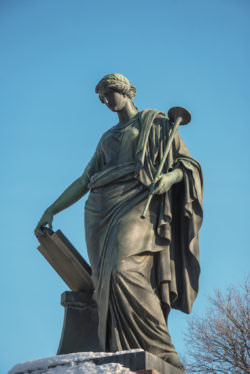
Muse of history code#
If you use any of the content on this page in your own work, please use the code below to cite this page as the source of the content. Her name is derived from the same Greek root word that means to celebrate, to recount, or to make famous. She would proclaim them and recount the history of the heroes. She was considered the celebrator of history, of astonishing deeds and incredible accomplishments. Her symbols include the scroll, books, or tablets. He could be considered the embodiment of the lamentation, which was a classical Greek song genre identified as the linos.Ĭlio was sometimes called the “Proclaimer”. Linus was the poet and musician and was a sibling of Orpheus. Some accounts reveal that Clio was the mother of Linus, though he is also depicted as being the son of the other muses Calliope or Urania. Hymenaeus (also spelled Hymenaios) was the patron god of weddings and was considered one of the winged gods of love, otherwise known as the Erotes. Some myths also suggest she had another child, Hymenaeus. In some myths however, it is said that Clio had Hyacinth with king Amyclas, the forefather of Sparta. His parentage depends on the myth, but often he is considered to be Clio’s son with King Pierus or King Obealus of Sparta. She had one son, Hyacinth, who was a divine hero in Greek myth. It was believed that Clio lived with her sisters, the Muses, on Mount Parnassos or Mount Helicon. Her name stems from the Greek root / meaning to recount. Many believed that the inspiration they required to write poetry, literature, music, or any artistic creation came from the nine Muses. Clio (ancient: KLEYEoh, but more recently KLEEoh) is the ancient muse of history. The Muses were considered to be the source of inspired creation. They were called Melete or 'Practice', Mneme or 'Memory' and Aoide or 'Song'. The muses followed Apollo while he wandered Mount Helicon where they lived. The Roman scholar Varro (11627 BC) relates that there are only three Muses: one born from the movement of water, another who makes sound by striking the air, and a third who is embodied only in the human voice. Their voices, songs and dancing was meant to relieve the sorrows over the world.Īccording to some myths, Apollo, the Greek god of the sun and of knowledge.

He wanted to celebrate the victory of the Olympians over the Titans and forget the hardships of life. The myth of their creation reveals that Zeus lay with Mnemosene nine times over the course of nine days to bring the Muses into the world. She is the daughter of Zeus, the sky god and leader of the Olympians, and Mnemosyne, the Titaness and goddess of memory. The Muses are nine different goddesses who are the patrons of arts, literature and the sciences. She is also often depicted holding a clarion in one hand and a book in the other. The ancient Greek word for history was derived from Kleos. Clio was the patron of history and the guitar.
Muse of history full#
She is often shown holding a scroll that is open or sitting beside a chest full of books. This connection with Apollo runs even deeper the Oracle of Delphi, the high priestess of the Temple of Apollo, lived on Mount Parnassus.Clio, also spelled Kleio, was one of the nine muses. Apollo gave him a golden lyre and taught him to play, leading to Orpheus's later mythical exploits. In most accounts, he is the son of Calliope and Apollo, often considered the leader of the Muses. Orpheus, the great poet and lyrist, was raised on Mount Parnassus. The mountain, unsurprisingly, comes up often in Greek mythology. Polyhymnia was the muse of sacred poetry. The Muses that live on their sacred mountain are always the same nine, however:Įrato was the muse of lyric poetry and love poetry. But the honor is usually given to Parnassus. In Hesiod's account, the Muses lived on another mountain, Mount Helicon. The main Greek gods lived on Mount Olympus, but the Muses were said to live on Mount Parnassus, another large mountain in Greece. Many poets also wrote hymns and odes dedicated to the muses, like Hesiod's Theogony.

Homer's Iliad begins with such an invocation ("Sing, Goddess, the rage of Peleus's son Achilles." in Lattimore's translation) as does the Odyssey.

In Greek poetry, it was customary to invoke the muses at the start of an epic poem. Memory was important for the Muses because in ancient times, when writing was uncommon, poets had to carry their work in their memories. In the most popular account, they were the daughters of Zeus, lord of all gods, and Mnemosyne, the goddess of memory. The Nine Muses were Ancient Greek goddesses (or nymphs) who ruled over the arts and sciences and offered inspiration in those subjects. Infoplease Staff The Goddesses of Inspiration


 0 kommentar(er)
0 kommentar(er)
